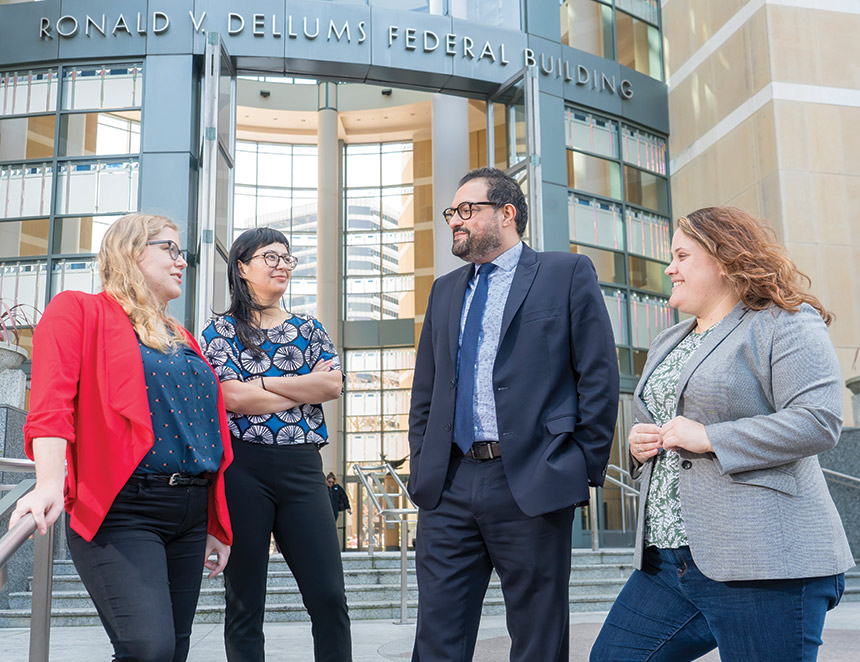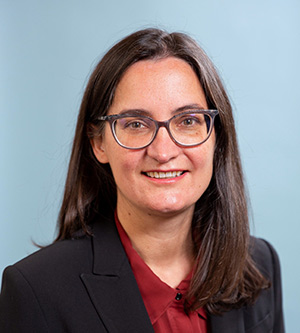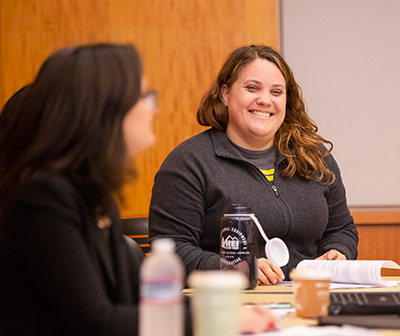
By Sarah Weld
Criminal prosecutors have far easier access to surveillance technology and other software to argue their cases than public defenders, due to a combination of funding disparities and some laws that favor prosecutors.
Faced with the other side’s digital evidence from cell phone searches or facial recognition software, public defenders often don’t know how to interpret what they are seeing, which can give the prosecution a distinct advantage. But thanks to Supervising Attorney Megan Graham from Berkeley Law’s Samuelson Law, Technology, & Public Policy Clinic, public defenders — and their clients — now have a fighting chance.
Leading the clinic’s technology-related criminal justice system work, Graham has trained more than 1,000 defense attorneys over the past three years in how to recognize, approach, and litigate cutting-edge technology issues on behalf of their clients.
“My overarching goal is to help level the playing field,” Graham says. “Defense attorneys realize that they need to know more about what’s happening and up their game because the government has so much more power. But they need help. They need to have a mechanism that helps them reset the balance when it comes to criminal cases.”
Tech support
There are several ways public defenders can learn from Graham — a workshop she co-leads with the Federal Defender Services Training Division, presentations at a National Association of Criminal Defense Lawyers (NACDL) conference, and numerous trainings and brown bag lunches at public defenders’ offices nationwide. Clinic students also help spread the word by advising clients; last spring, for example, a student team led a 90-minute training and developed a tool kit for a public defender’s office.

“Defense attorneys are at a systemic disadvantage when it comes to learning how invasive new technologies are being used in their cases,” says Clinic Director Catherine Crump. “The trainings the clinic runs, under Megan’s leadership, help defense attorneys be vigilant because many new technologies turn out to be inaccurate or used by the government without adequate regard for constitutional restrictions.”
In November, the clinic co-hosted the third annual technology-focused trial skills workshop with the federal defender trainers. The workshop teaches federal defenders and Criminal Justice Act attorneys about technologies they might run across in their clients’ cases, and helps them practice trial skills like cross-examination of a government expert, direct examination of defense experts, and oral argument.
This year, about 60 participants spent six days practicing these skills in small virtual group sessions that paired a seasoned federal defense attorney with a technology law expert (Berkeley Law professors Orin Kerr and Andrea Roth have presented in the past). Across the three years of the program, more than 200 attorneys have attended.
“They are learning about emerging technology issues and the bread-and-butter skills work that trial lawyers need to have,” Graham says. “We are putting the best of both worlds together to help defense attorneys around the country.”
A shifting landscape
Workshop co-leader Lisa Lunt, an attorney advisor with the U.S. Courts Defender Services Office’s Training Division who has worked in criminal defense for 22 years, says the role of digital technology in federal cases has mushroomed over the past five years.
“Back in the day for many cases we used to get a little paper file with the government’s evidence. These days nothing is on paper, and often evidence for one of those cases will now be on a thumb drive that has gigabytes of data with a staggering quantity of digital technology data,” she says. “Oftentimes we feel totally overwhelmed. The idea that we can arm up and really fight is exciting.”
Defenders learn, for example, that if the other side cites location tracking on a cell phone, they can push back and note how unreliable that technology can be, based on expert witness testimony and research. Many of these new technologies can be challenged in court, much like polygraph tests which are now considered unreliable evidence.
Some digital technology can also reinforce racism in the criminal justice system. This includes facial recognition software, which does a poor job of identifying brown-skinned people or predictive policing algorithms that direct law enforcement toward already over-policed communities, Graham says.
Public defenders may also learn from Graham and experts like Roth at the NACDL Fourth Amendment Conference, which organizers hope to hold in person again this May — the first in-person conference was in Berkeley in 2018.
Leveling the playing field
“There is no part of criminal defense practice that isn’t touched by technology, but the reality is the defenders have a lot of cases and not a lot of time to dig into it,” says Jumana Musa, director of the NACDL’s Fourth Amendment Center. “These trainings are meant to provide defense lawyers with the nuts and bolts and also places to go when they face this technology. ‘What is this thing? What are the challenges? Who can I reach out to? How do I talk to an expert witness?’

“Megan is the best kind of secret weapon. She is fully immersed in the technology but doesn’t approach it from a privacy perspective. She approaches it very much from, ‘How does this affect the accused and how can lawyers defend against it?’”
Situations where public defenders may need to know more about technology are widespread. They range from cases involving the Stored Communications Act, which does not give public defenders the same access to records like email or social media as prosecutors — which Professor Rebecca Wexler has written about — to cases involving geofence warrants, probabilistic genotyping software, attorney-client privilege email issues, black box algorithms, and license plate readers.
Often the prosecution will present evidence from these technologies and the defenders don’t realize where the information came from, Graham explains. And many defenders’ offices don’t have the resources or time to bring their attorneys up to speed.
Tailored teaching
This is where Graham’s expertise and teaching skills come in, her colleagues say.
“The learning curve for lawyers is super high. Megan not only knows this content extremely well, she is gifted in knowing how people in the field need to learn it, understand it, and use it to put forward the best defense possible. If I were still practicing, I would have Megan on speed dial and bother her constantly,” Lunt says.
Musa agrees: “Megan is not just expert in the issues but she is also approachable. People can be very intimidated — she makes it feel doable, but she’s also extremely strategic about the way she approaches the work, so anything that Megan does is very thoughtful and done with a perspective of how to help the most people do the most good.”
From Musa’s view, as technology grows more complex and lawyers have to keep up with ever-changing tech-related legal issues, the clinic’s expanded criminal justice work — and the students who graduate with these skills — prove more and more crucial.
“They’re not just doing the work, they’re raising lawyers who are knowledgeable and expert in these issues and able to fill some of these gaps,” she says. “Both the work that the clinic does and the specific focus that Megan brings to the work is necessary. They are unique in the field in their ability to pull together these trainings from a base of academia but oriented to real-life practice.”